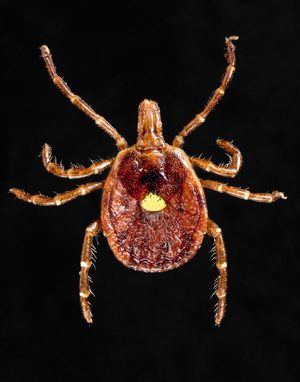The curious link between alpha-gal allergy and deer season

Say you wake up in the middle of the night with a few hives on your arms. You might take some Benadryl and go back to sleep. Another night, you wake up with hives covering your body. You’re also having trouble breathing. Your face and hands might be swelling. You end up in the emergency room with a dose of epinephrine and a doctor asking questions. What caused this anaphylactic reaction? You don’t have a known food allergy, and besides, they usually occur within minutes and you haven’t eaten in over four hours. You haven’t changed your medication, and you weren’t bitten by an insect. The doctor chalks it up to an unknown origin and sends you on your way. You’re left to wonder what might have triggered such an intense reaction and what might happen next time.
Or perhaps you have colon cancer and you’re undergoing chemotherapy with the drug Erbitux (cetuximab). During treatment, you break out in hives. Maybe you collapse. If you live in the South, your risk of having this reaction to the drug is one in five. When Dr. Bert O’Neil, an oncologist at UNC, presented this finding at a conference in New York, doctors there were puzzled. Their patients weren’t having this reaction to the drug.
| An abstract of Dr. Platts-Mills’ article, including maps and graphs from the full publication is available. Click here. |
Dr. Thomas Platts-Mills, head of the Division of Allergy and Clinical Immunology at the University of Virginia, had heard these anecdotes and wondered if there was a link. He found that both types of patients tested positive for having IgE antibodies. This suggests they were allergic to a sugar informally known as alpha-gal.
A person who has the alpha-gal allergy doesn’t experience any symptoms until something triggers a reaction. It became clear the chemo drug was acting as a trigger, but what was causing people to show up at the ER in the middle of the night? The alarming answer seems to be eating meat from mammals such as beef, lamb and pork. To complicate the situation even further, it doesn’t behave like a typical food allergy. Not only is the reaction delayed, it’s also unpredictable. It doesn’t occur every time you’re exposed to the trigger, and when it does, the reaction can vary each time. If you have the alpha-gal allergy, eating this type of meat is akin to playing Russian Roulette. If you eat a dozen steaks, one might cause some mild itching and wheezing. The next one might kill you. Even though the reaction might not occur 100 percent of the time, the only treatment is 100 percent avoidance.
 But what was causing people to develop the allergy in the first place? Dr. Platts-Mills believes he’s found the culprit – our all-too-common lone star tick (Amblyomma americanum, pictured at right). When he interviewed patients who’d had reactions to Erbitux, many of them reported having had tick bites. He also found that the area where people were having reactions overlaps almost exactly with the range of the lone star tick. He noted that the increase in alpha-gal allergy in recent years has coincided with the tick expanding its range and becoming more abundant.
But what was causing people to develop the allergy in the first place? Dr. Platts-Mills believes he’s found the culprit – our all-too-common lone star tick (Amblyomma americanum, pictured at right). When he interviewed patients who’d had reactions to Erbitux, many of them reported having had tick bites. He also found that the area where people were having reactions overlaps almost exactly with the range of the lone star tick. He noted that the increase in alpha-gal allergy in recent years has coincided with the tick expanding its range and becoming more abundant.
Lone star ticks occur on all sorts of animals, but their spread is most likely tied to the increasing population of white-tailed deer. In the 1880s, deer were almost extirpated from N.C., but thanks to changes in hunting laws and efforts at restocking, populations started to recover by the 1950s. Today, we have an estimated 1.25 million deer in the state.
At this point, it’s unclear what it is about a tick bite that causes people to become sensitized. Dr. Platts-Mills believes it’s something inherent in the tick’s saliva, not an infectious disease like Rocky Mountain spotted fever. He also believes if tick bites are especially itchy, the risk of developing the allergy is higher.
In May, I had a few bites that itched for almost a week. I think about them now whenever I tuck into a burger or steak. Those of us who enjoy the outdoors and are routinely exposed to lone star ticks need to be aware of this allergy. If we wake up in the middle of the night with the symptoms I’ve described, we need to take it seriously. In remote areas of the Uwharries, it can take an awfully long time to get to an emergency room. It’s also important to remember that this link between alpha-gal, tick bites and eating certain kinds of meat has come to light only recently, so many doctors are unaware of it. If you’ve been exposed to ticks and have an otherwise unexplained anaphylactic reaction, it might be worth finding an allergist who can test you for alpha-gal.
I’m beginning to think of white-tailed deer as a public health hazard. Not only do they leap in front of our vehicles, they’re also helping spread a nasty allergy. Without enough natural predators in our ecosystem, we have to rely on hunters to keep their population in check. If we aren’t already allergic to alpha-gal, it might be a good idea to eat a little more venison. And also consider keeping a flock of tick-hungry guineas.
Many thanks to Joe and Terry Graedon for addressing this issue and interviewing Dr. Platts-Mills on The People’s Pharmacy. For a complete transcript of this story and to read listener responses, go to http://www.peoplespharmacy.com/2011/10/01/830-alpha-gal-allergy.